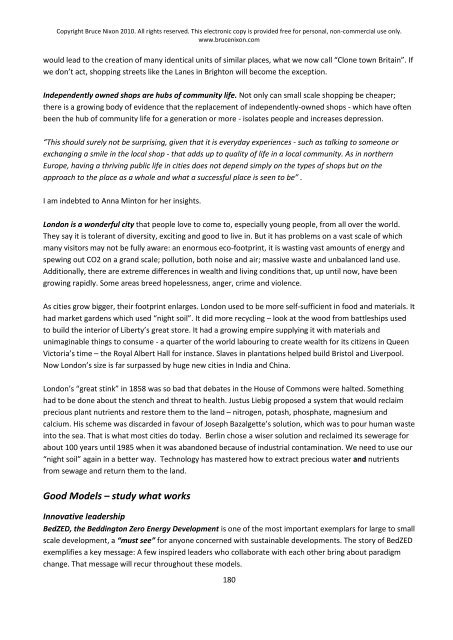A better world is possible - Global Commons Institute
A better world is possible - Global Commons Institute
A better world is possible - Global Commons Institute
Create successful ePaper yourself
Turn your PDF publications into a flip-book with our unique Google optimized e-Paper software.
Copyright Bruce Nixon 2010. All rights reserved. Th<strong>is</strong> electronic copy <strong>is</strong> provided free for personal, non-commercial use only.<br />
www.brucenixon.com<br />
would lead to the creation of many identical units of similar places, what we now call “Clone town Britain”. If<br />
we don’t act, shopping streets like the Lanes in Brighton will become the exception.<br />
Independently owned shops are hubs of community life. Not only can small scale shopping be cheaper;<br />
there <strong>is</strong> a growing body of evidence that the replacement of independently-owned shops - which have often<br />
been the hub of community life for a generation or more - <strong>is</strong>olates people and increases depression.<br />
“Th<strong>is</strong> should surely not be surpr<strong>is</strong>ing, given that it <strong>is</strong> everyday experiences - such as talking to someone or<br />
exchanging a smile in the local shop - that adds up to quality of life in a local community. As in northern<br />
Europe, having a thriving public life in cities does not depend simply on the types of shops but on the<br />
approach to the place as a whole and what a successful place <strong>is</strong> seen to be” .<br />
I am indebted to Anna Minton for her insights.<br />
London <strong>is</strong> a wonderful city that people love to come to, especially young people, from all over the <strong>world</strong>.<br />
They say it <strong>is</strong> tolerant of diversity, exciting and good to live in. But it has problems on a vast scale of which<br />
many v<strong>is</strong>itors may not be fully aware: an enormous eco-footprint, it <strong>is</strong> wasting vast amounts of energy and<br />
spewing out CO2 on a grand scale; pollution, both no<strong>is</strong>e and air; massive waste and unbalanced land use.<br />
Additionally, there are extreme differences in wealth and living conditions that, up until now, have been<br />
growing rapidly. Some areas breed hopelessness, anger, crime and violence.<br />
As cities grow bigger, their footprint enlarges. London used to be more self-sufficient in food and materials. It<br />
had market gardens which used “night soil”. It did more recycling – look at the wood from battleships used<br />
to build the interior of Liberty’s great store. It had a growing empire supplying it with materials and<br />
unimaginable things to consume - a quarter of the <strong>world</strong> labouring to create wealth for its citizens in Queen<br />
Victoria’s time – the Royal Albert Hall for instance. Slaves in plantations helped build Br<strong>is</strong>tol and Liverpool.<br />
Now London’s size <strong>is</strong> far surpassed by huge new cities in India and China.<br />
London’s “great stink” in 1858 was so bad that debates in the House of <strong>Commons</strong> were halted. Something<br />
had to be done about the stench and threat to health. Justus Liebig proposed a system that would reclaim<br />
precious plant nutrients and restore them to the land – nitrogen, potash, phosphate, magnesium and<br />
calcium. H<strong>is</strong> scheme was d<strong>is</strong>carded in favour of Joseph Bazalgette’s solution, which was to pour human waste<br />
into the sea. That <strong>is</strong> what most cities do today. Berlin chose a w<strong>is</strong>er solution and reclaimed its sewerage for<br />
about 100 years until 1985 when it was abandoned because of industrial contamination. We need to use our<br />
“night soil” again in a <strong>better</strong> way. Technology has mastered how to extract precious water and nutrients<br />
from sewage and return them to the land.<br />
Good Models – study what works<br />
Innovative leadership<br />
BedZED, the Beddington Zero Energy Development <strong>is</strong> one of the most important exemplars for large to small<br />
scale development, a “must see” for anyone concerned with sustainable developments. The story of BedZED<br />
exemplifies a key message: A few inspired leaders who collaborate with each other bring about paradigm<br />
change. That message will recur throughout these models.<br />
180
















